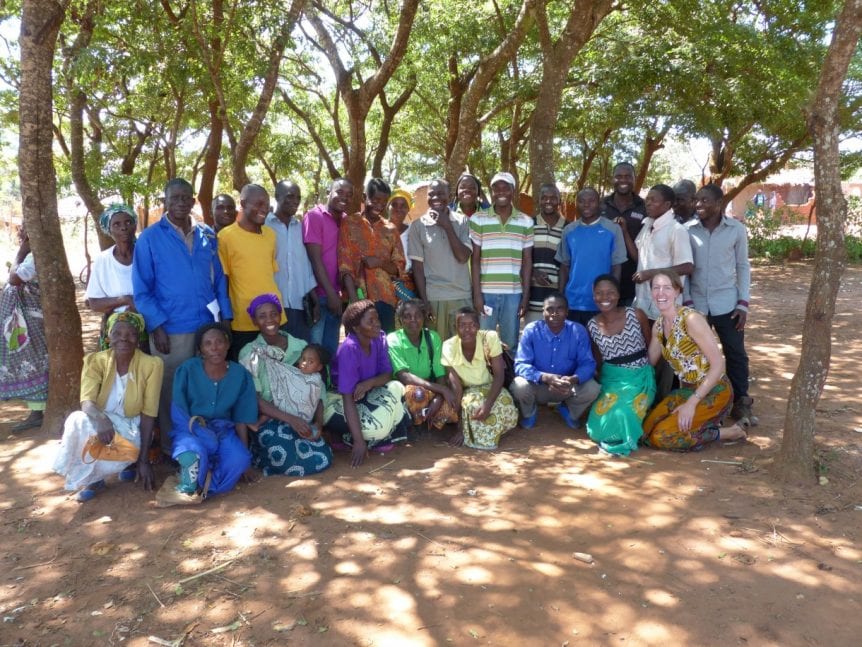Continuing our series on the Leland International Hunger Fellows and their policy placements, we turn our focus to Jennie Lane, placed with Land O’Lakes International Development in Malawi and Washington, D.C.
Jennie Lane
 Jennie Lane (front, right) with other L4R field staff and project-trained community animal health workers in Ntchisi district, Malawi.
Jennie Lane (front, right) with other L4R field staff and project-trained community animal health workers in Ntchisi district, Malawi.
“So, do you consider livestock as a part of agriculture?” A few days ago someone very smart asked me this question, with sincerity, curiosity, and a little bit of skepticism. Agriculture, by Google’s definition is: the science or practice of farming, including cultivation of the soil for the growing of crops and the rearing of animals to provide food, wool, and other products. So, yes, I consider livestock agriculture!
Working as a veterinarian in international development, I straddle a divide between two fields that have historically struggled to work with each other – the fields of agriculture (in all its forms) and human nutrition. This is counterintuitive, because agriculture produces food which is necessary to not only sustain life but also have a healthy and nourished body! Almost 800 million people in this world are undernourished. Stunting, malnutrition and deficiencies of iron, zinc, Vitamin A, and iodine are blamed for over 50 percent of deaths of children under five years old. There is strong evidence that adding a small amount of animal source protein – due to its high quality and bioavailable micronutrients – to a mostly cereal-based diet vastly improves its nutritional adequacy . This is particularly important for children, and pregnant and lactating women that are at risk for undernutrition and micronutrient deficiencies. A major component of increasing the accessibility and availability of safe, high quality animal source protein is making sure there are healthy, productive livestock to produce such proteins, while also addressing the potential health and environmental risks associated with raising livestock.
Livestock are the lifeblood of many rural communities around the world – in both developing and developed nations alike. Some livestock – especially chickens, goats, and donkeys – are particularly valuable to women, not necessarily for the animal source proteins that they produce, but for their contribution to household income and productivity. Donkeys also vastly reduce the work burden that women or children have to do, such as carrying water, preparing fields, or taking goods to market. In many communities, chickens and goats are the literal bank for a household: chickens are like an ATM, quickly converted into cash for small purchases like salt, cooking oil, and soap, while goats are like a savings account and sold for needs like crop inputs, staple foods during the lean season, or major emergencies. Understanding how livestock fit into the household economic puzzle as sources of food savings, and income is integral to helping households improve their livelihoods, their resilience, and their nutrition.
 In many communities, chickens and goats are the literal bank for a household.
In many communities, chickens and goats are the literal bank for a household.
Gaining better knowledge of the pathways of impact of livestock on household nutrition and resilience was a major reason why Land O’Lakes International Development wanted a Leland Fellow for the 2015-2017 class. The first year of my fellowship I supported their Livestock for Resilience (L4R) project in central Malawi, both as an Animal Health and Livelihoods Technical Advisor, but also diving into understanding these pathways. The L4R team was great to work with, and while the project had some major hurdles to overcome, we worked together and were able to accomplish a lot. I’m still realizing the extent of the knowledge and experience I gained that year. The sheer amount of time spent in the field, working with farmers and project staff, learning their challenges and how things actually work at the household and local level was incredibly valuable. It is this knowledge that has been so important to bring back to Washington D.C for my policy year.
Essentially everything I have worked on in the first six months of my policy year draws deeply from what I learned last year in Malawi. Land O’Lakes International Development, in collaboration with the International Livestock Research Institute, is hosting a four part learning series titled Livestock, Animal Source Foods and Human Nutrition; I’ve been a co-developer, helping craft the sessions, identifying content, organizing speakers, and presenting my own research. I have also been working with our team in Ethiopia, helping design a nutrition-sensitive agriculture manual that specifically looks at promoting the production of nutrient-rich fruits and vegetables and animal source foods to improve nutrition, as well as how village savings-and-loan associations could help maximize nutrition and health outcomes.
 Donkeys also vastly reduce the work burden that women or children have to do, such as carrying water, preparing fields, or taking goods to market
Donkeys also vastly reduce the work burden that women or children have to do, such as carrying water, preparing fields, or taking goods to market
Lately, I’ve thought of myself as somewhat of an integration officer in my technical advisory capacity. Informed in large part from my training as a veterinarian, I innately see the interconnectedness of how crop production, soil health, livestock health, livestock disease, human health, human nutrition, water, and climate issues all fit together. This concept is also known as “One Health.” In multi-sectoral, nutrition-agriculture-water-sanitation-hygiene projects, figuring out how to connect all the pieces in fields that have been traditionally siloed is challenging. This systems-level thinking and understanding how all the pieces fit together has been essential to me for informing some new project design sessions that I have been part of.
I’m not sure what lies ahead when my Leland fellowship is over at the end of August. But one thing I know for certain is that my year in the field in Malawi has better prepared me for anything that might come next; policy-wise, or otherwise!

